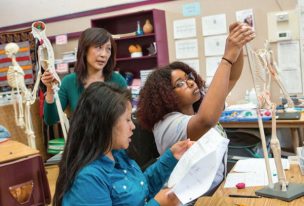Teachers as Agents of Their Own Learning
In our 2014-15 program evaluation survey, conducted by WestEd, our teacher scholars’ feedback indicated overwhelmingly positive attitudes about their collaborative inquiry work through their Mills Teacher Scholars partnership. What aspects of the Mills Teacher Scholars work resonate with teachers?

Facebook posts such as these imply that educators are rarely upbeat and active participants in professional development opportunities.
The reality that we experience at Mills Teacher Scholars is that teachers are open and hopeful to new professional development, but often jaded by the top-down training model they have frequently experienced. In this top-down model the goal is to “tool” the teacher with new curriculum and content strategies to implement and the delivery often resembles the banking model of learning where key information is deposited by the trainer into the minds of the learner (the teachers).
Undoubtedly, teachers need access to the most current thinking about enhancing student learning, but professional development design impacts both teacher engagement in the process and professional learning outcomes. Those designing learning experiences for teachers need to carefully consider the following questions: What is the instructional approach for teachers to build their conceptual understanding? How does the local knowledge of teachers intersect with district or school learning goals?
In our 2014-15 WestEd Survey Mills Teacher Scholars participants’ feedback indicated overwhelmingly positive attitudes about their learning through engagement in their year-long Mills Teacher Scholars inquiry experience.
• 94% of teacher scholars stated that they had changed their instruction based on what they learned through the inquiry process
• 94% of teacher scholars said they had a better understanding of what their students are thinking and learning as a result of their inquiry
• 95% said they had improved strategies for meeting students learning needs as a result of their inquiry
• 93% agreed that they had strengthened their collaboration skills
• 94% said their colleagues had helped them improve their teaching as a result of their inquiry sessions
Teachers’ comments confirm that they see this experience as significantly different than other professional development—almost the opposite of the derisive social media post example above.
“As teachers, we’re rarely given the time to think about our practice. Our inquiry sessions guaranteed time to think about how our practice influences individual students’ academic work. I also appreciate the time to process through think time and through conferencing with colleagues and the time to focus on what my students CAN do, rather than focusing on what they can’t do. Mills Teacher Scholars creates space for teachers to be agents of their own practice and that is not only affirming, but also powerful as professionals”
“I absolutely love having the time to discuss and learn from other fellow educators and really reflect on our own practice and what we truly want our students to be able to do. It is refreshing, inspiring, and empowering to be a part of the inquiry sessions. It is so easy to get overly stressed and burnt out with how busy we are throughout the school year, constantly getting things thrown at us left and right that we hardly ever get a chance to really take a step back and stop and breathe and remember why we’re all doing this. I have learned so much from my colleagues as well as from the other facilitators and feel so thankful to be a part of this work.”
The comments fell along 3 major themes: teacher agency, structured time for evidence based reflection, and collaborative learning. These are central to the work of Mills Teacher Scholars and point to why teacher scholars report high levels of satisfaction with the work and, most importantly, increased understanding of student learning and changed instructional practice .
1) Teacher Agency
There is a push in education to attend to the engagement of the learner as central to meeting the learning goals. This is also true in adult learning. Adults need professional agency and choice in their learning and the opportunity to draw on their rich prior knowledge and experiences.
2) Structured time for Evidence Based Reflection
Teachers rarely have a structured time and space to think through areas of uncertainty in their practice. Professional learning systems need to balance time spent training and planning with reflection and analysis of meaningful student learning data as related to teacher practice.
3) Collaborative Learning
Collaborative teacher learning unlocks the deep local pedagogical content knowledge present in all schools and spreads professional expertise. Teachers value learning with and from their colleagues and need opportunities for vertical and cross-discipline collaboration as well as within their grade level.
Those designing professional learning for adults, just like for children, must attend to social-emotional learning. This includes: attending to engagement and motivation, making time for self-reflection, cultivating and supporting relationships with and between teacher learners, and creating a learning environment where uncertainty and learning from mistakes is a valued part of the collaborative learning process.
When teacher scholars choose an area of focus within their school’s larger area of inquiry, collect and analyze meaningful classroom data and make changes to their practice that come as a result of the new understandings, they are indeed agents of their own learning and value their professional development as a result.

